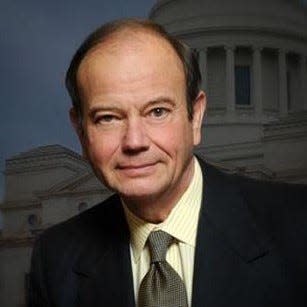Keith Ingram has had his fill | Steve Barnes

It occurred to Keith Ingram about a year ago, during the 2021 regular session of the General Assembly: He was wincing more than winking.
In committee or on the Senate floor, in the cloakroom or in the Capitol corridors, the utter absurdity of what so often passed for issues was beginning to gnaw at him. The state was failing to address the needs of its developmentally disabled, was holding public school appropriations to the absolute constitutional minimum and effectively encouraging student debt by funding higher education with similar indifference. Arkansas’ teen pregnancy rate remained dismayingly high while acceptance of COVID-19 vaccines was frighteningly low, and as attempts to control the pandemic hit one political roadblock after another. Complicating matters: For better or for worse, the Republican majorities in the House and Senate were turning against a governor of their own party and sometimes against one another.
As in every legislative body, every political forum, there had always been, always will be grandstanding: Speeches, delivered with a wink, intended strictly to soothe the folks back home; bills and resolutions, introduced with a wink, designed by their authors to die in committee. A lawmaker’s plea for a colleague’s assistance in passing a piece of legislation often had an occasional counterpart – help me kill my bill and I’ll help you kill yours. A wink. And the business of serious governance would go forward.
Now Ingram was wincing at what posed as seriousness: critical race theory, “election integrity,” restroom regulation and transgender phobia. State sovereignty. Guns, guns, guns; abortion, abortion, abortion.
Ingram, a Democrat of West Memphis, had represented his Delta district in the House and Senate for a dozen years, having never had a Republican opponent and winning the odd primary election by stupendous margins. He had followed his father both as mayor of West Memphis and in the statehouse; his older brother, too, served in the Senate. His seat was secure, one of the few safe blue seats. He would not so much run for another term as claim it.
He would do neither. On Jan. 7, Ingram announced that he has had his fill. The General Assembly, and the Senate in particular, was now “held hostage by those who are reckless, selfish and short-sighted.” In recent months, Ingram continued, “I spent more time trying to defeat foolish, divisive measures than working to pass substantive, meaningful legislation.”
Later, in an interview, “The Senate always had the reputation of being the place where bad legislation was sent to die,” Ingram said (exaggerating to some extent the chamber’s success at paternalism). “That’s not true any longer.”
Part of the problem, Ingram told me, was the nationalization of most every issue of any significance, and the creation of “issues” that were anything but. He long ago grew accustomed to Republican colleagues stopping by his desk to whisper their apologies for voting for one or another inanity.
“They’re afraid they’ll be ‘primaried,’” Ingram sighed – not without some justification. With rare exceptions – in the Delta, in Pulaski County, in a few northwest Arkansas districts – the legislature has become no place for moderates. The latest redistricting, no surprise, tilts to the right. The center, in raw numbers, has become the fringe.
“We used to pride ourselves on our independence,” Ingram said, “as voters and elected officials. A senator could speak on the floor and maybe change a vote or two, no matter which party was in control of the chamber. And we’ve lost that.”
Take for example, Ingram offers, the legislature’s wresting of power from local governments (inhibited to some extent, if perhaps temporarily, by the courts).
“Voter fraud! There might be a [spurious] absentee ballot or two, but nothing that would make any difference in any election. But now we’ve given a tremendous amount of authority to the state election commission. We would raise so much Cain if the Feds did to [the state] what we did to local governments in last two sessions …” Tenth Amendment, indeed.
It is too early to get a firm read on the metabolism of Arkansas’ next Senate. Conservative, of course; and the minority Democrats will have to scramble to compensate for the loss of institutional memory brought about not only by Ingram’s departure but the absence of Joyce Elliott of Little Rock, term-limited.
To be considered also is the decision by fire-breathing Republican Trent Garner of El Dorado to step aside, the primary challenge to fellow arch-conservative Bob Ballinger of northwest Arkansas, and the new and possibly less hospitable district that now awaits Mark Johnson in, primarily, Faulkner County.
“I think the pendulum will eventually swing back to the center,” Ingram believes, “but it’s going to be a bumpy road.” Some time, in other words, before there is again more winking than wincing.
Steve Barnes is the host of "Arkansas Week" on Arkansas PBS.
This article originally appeared on Fort Smith Times Record: Keith Ingram has had his fill | Steve Barnes
